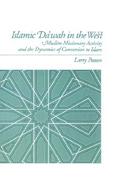Description:
Early expansion of Islam was predicated upon an "external-institutional" missionary approach which involved the political conquest of nations followed by the establishment of Muslim institutions. Conversion occurred as the masses became enculturated to the new environment. This external-institutional approach proved impracticable in the modern West, however, and Islam effected a transformation in its method of outreach. Poston here explores the concept of dawah--Islamic missionary activity--as it has evolved in contemporary Western societies. As a response to the demands of the Western social context, he shows, Muslims in the West have adopted an "internal-personal" approach, which aims at the conversion of individuals and seeks to influence society from the bottom upwards. Beginning with the teachings of Hasan al-Banna' and Abul A'la Mawdudi, this adaptation has led to the establishment in America and Europe of "para-mosque" organizations. Poston documents the institutionalization of the new missionary strategy in North America, profiling various organizations and institutions established for the propagation of the Muslim faith, and analyzing their missionary philosophies, strategies, and techniques. Turning his attention to those who heed the "call", Poston creates a profile of the "typical" convert to Islam. Examining the experiences of numerous converts, he compares them to a psychological profile of the "typical" religious convert. The results of a questionnaire-survey are combined with an analysis of published testimonies to identify significant traits that distinguish converts to Islam.
Expand description
Product notice
Returnable at the third party seller's discretion and may come without consumable supplements like access codes, CD's, or workbooks.

Please Wait

